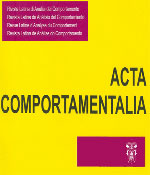Rule Control: Effects of Questions, Suggestions and Orders
DOI:
https://doi.org/10.32870/ac.v19i1.28011Keywords:
instructional control, control by contingencies, suggestion, order, questionsAbstract
Some authors agree that manipulations of formal properties of rules, as well as questions about the behavior which produces reinforcement, can interfere in rule-following. However, few studies have investigated experimentally these possibilities. The present study aimed to investigate the effects of an experimental history of reinforcement on subsequent following of a rule discrepant from the contingencies, when such rules are presented either in the form of an order or suggestion, and the participants are, or are not, asked to answer questions about the contingencies. Twenty four undergraduate students were exposed to a matching-tosample procedure. In each trial, one sample and three comparison stimuli were presented to the participant, who had to point to the comparison stimuli in a sequence. The students were distributed into four conditions. Each condition, composed by six participants, had three phases. In Phase 1 of all four conditions, the correct sequence was shaped by their consequences (points exchangeable for money) and maintained in a fi xed ratio schedule (FR 4). In Phases 2 and 3, the contingencies were maintained with no changes, but the formal properties of the discrepant rules were manipulated. The four conditions differed regarding to the presentation, or not, of questions in Phase 1; and, regarding the presentation of the rule in form of a suggestion and an order in Phases 2 and 3. In the beginning of Conditions 1 and 3, the participants were exposed to questions about the correct sequence and the operative reinforcement schedule. In Conditions 2 and 4, no questions were asked. In Conditions 1 and 2, Phase 2 began with the suggestion and Phase 3 with the order. In Conditions 3 and 4, Phase 2 began with the order and Phase 3 with the suggestion. Phase 1 ended after obtaining four consecutive points in FR 4, as long as the participant had obtained a minimum of 16 points. Phases 2 and 3 ended after 80 trials. Twenty two participants reached the criterion which ended Phase 1 and were exposed to the following phases. In Condition 1, 5 out of 6 participants finished Phase 2 not following the suggestion. In Phase 3, all six participants finished without following the order. In Condition 2, 3 participants followed and 3 did not follow both the suggestion (Phase 2) and the order (Phase 3). In Condition 3, 3 out of 5 participants followed the order in Phase 2 and all 5 did not follow the suggestion in Phase 3. In Condition 4, all 5 participants followed the order in Phase 2 and 4 out of 5 followed the suggestion in Phase 3. It is suggested that the maintenance or not of following discrepant rules depends, in part of: 1) if the listener discriminates the discrepancy between the consequences described in the rule and the consequences produced by rule following; and, 2) the formal properties of the rule.Downloads
Download data is not yet available.
Downloads
How to Cite
de Albuquerque, L. C., de Andrade Mescouto, W., & Paiva Paracampo, C. C. (2011). Rule Control: Effects of Questions, Suggestions and Orders. Acta Comportamentalia, 19(1). https://doi.org/10.32870/ac.v19i1.28011
Issue
Section
Articles
License

<a rel="license" href="http://creativecommons.org/licenses/by-nc-sa/4.0/"><img alt="Licencia de Creative Commons" style="border-width:0" src="https://i.creativecommons.org/l/by-nc-sa/4.0/88x31.png" /></a><br />Este obra está bajo una <a rel="license" href="http://creativecommons.org/licenses/by-nc-sa/4.0/">licencia de Creative Commons Reconocimiento-NoComercial-CompartirIgual 4.0 Internacional</a>.






